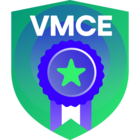I finished my VMCA journey this week and passed the exam 😎🎉🎉🎉.
So, I would like to write down some of my experiences and difficulties on this trip for others.
1. What is the VMCA?
The Veeam certified Architect (VMCA) is the second and highest Veeam certification after the Veeam Certified Engineer (VMCE).
The VMCA is all about developing a backup solution and understanding the "Veeam Architecture Methodology", whereas the VMCE is more concentrated on technical aspects.
2. The course
The "Veeam Architecture Method" is the overarching theme of the course.
It refers to the steps a Veeam Architect takes when creating a Veeam backup solution:
Discovery - conceptual design - logical design - physical design - implementation and governance - validation and iteration.
You will gain knowledge of how to:
- identify all stakeholders, capture the current environment, requirements, and risks - and analyze them by applying best practices.
- make the right requests to the correct persons to extract needed information.
- develop a high-level concept, refine it, and translate it into the final design.
- enable and support the work of the implementation team.
- validate and further develop the solution.
I could already tell how unique this training would be in comparison to others at the outset of the course.
You won't work with the Veeam products during the course, and there is no lab component.
Instead, there were team exercises where we would work on a given scenario together, talk about our results and could ask the trainer who acted as the client if we were unclear or wanted more information. After that the team solution is presented to the other participants.
This made the entire course really interactive, I liked this approach very much.
Additionally, there wasn't always a single solution available for a certain issue or requirement, which occasionally led to interesting discussions and a variety of viewpoints. With this you could see how different each participant interprets the given requirements ( I thought this in the exam, too… we'll see this in the exam part later on).
There is a lot of theory that is taught in the course, but throughout the course it was never boring because of the interactive approach. By alternating between theory and subsequent team tasks in which what was just learned was applied, I also didn't feel overwhelmed.
However, I was relieved when we were told that all the formulas for sizing the individual components of the environment would not be asked in the exam.
The formulas are really helpful, but you don't necessarily have to learn them by heart.
The training also covered many general backup and design issues. The final design steps will begin to map the components to the appropriate Veeam features and products, but the methodology is so general and universal that it can be applied to virtually all backup products. So, it is more a general architect training than a pure Veeam training.
3. The Exam
Who is eligible to sit the exam?
- complete the course “Veeam Backup & Replication v11: Architecture and Design” - or -
- already hold the Veeam Certified Architect v1 certification
- Knowledge taught in the VMCE course or comparable practice experience is recommended, but it is not a requirement to have completed the VMCE certification or course.
What can I expect on the exam?
The exam consists of 40 multiple-choice questions with either one or more correct answers to choose from. 70% correct answers are required (28 out of 40) to pass the exam.
The questions are based on a scenario provided with the exam that describes, for example, a project where a Veeam environment is to be modernized and new requirements are to be met. There are multiple scenarios, so this is just one example.
A valuable tip beforehand was that the scenario is presented in multiple tabs on the screen. So definitely pay attention here to read the whole scenario and not just one tab!
There are 90 minutes for the 40 questions, and all non-native speakers get an additional 30 minutes as compensation.
The individual questions always refer to the scenario. If a question asks for a deviation from the scenario (e.g., "The customer has decided that..."), this only applies to the current question and not to other questions!
With good practical experience and methodology from the course, you can answer the questions well. There are - as in every exam - some questions where you can disagree (as already described in the course section), but these do not matter so much.
How to prepare for the exam?
Once there are extensive course materials with which you can easily understand and repeat the Veeam architecture methodology.
There is also an online test available for the course participants, which gives a good feeling of how the exam will proceed and what level is expected. Unfortunately, there is only one version of the online test, so a second and third attempt is not very meaningful.
Third, there is a really great video series by Rasmund Haslund in which he goes through the questions of the online test. Here you get a very good impression of how the questions are structured and how best to proceed to find the solution. It is a pity that the video series is based on the same questions as the online test.
However, the videos are a clear recommendation for preparing for the exam.
You can find them here:
https://www.youtube.com/playlist?list=PLUzaaV7RJxb0FrsRv1_b_EWH2VVXdRcKu
There are videos for the VMCE exam questions, too. Watch them, if you want to gain some more experience with Veeam products.
Where to take the exam?
There are two ways to take the exam:
- at the Pearson-Vue Test Center.
- as a proctored online version
Both versions have certain prerequisite and requirements. The current valid regulations for both versions can be read at this link:
https://home.pearsonvue.com/Test-takers.aspx
Attention:
Currently (December 2022) there are still Corona restrictions in the test centers (at least in Germany). The wearing of a FFP2 mask in the building and the presentation of a 2G proof is mandatory!
I chose Pearson-Vue Test Center to take the exam.
It was too unreliable for me to meet all the requirements for the room and the computer. In the test center everything is prepared for you, and you have a quiet environment without phone, chat or anything else within reach.
4. Recommendation
I can recommend this course to anyone who is an architect or consultant.
I learned a lot in the two days and was able to question my previous solutions more than once and improve them with the new knowledge.
The VMCA exam is recommended for anyone designing and sizing backup solutions. It is not easy and quite demanding, but this also makes it a value in the market.
Many thanks to Veeam and the development team for this great course and challenging exam. 👍🏼









